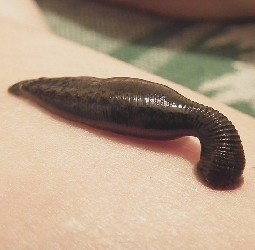

Leech saliva contains hirudin, an anticoagulant and anti-platelet agent that works to prevent blood clots and reduce the amount of congested blood in the tissues. This is when medicinal leech therapy may be recommended for an optimal outcome. If the congestion is left untreated, carbon dioxide will accumulate in the stagnant blood and ultimately cause tissue death.

Instead, the blood pools in the veins and is unable to flow back to the heart and lungs to be re-oxygenated. Venous congestion occurs when the tiny, thin-walled veins involved in microsurgical procedures are unable to carry the appropriate amount of blood away from the surgical site. Although these procedures are successful up to 98 percent of the time, in rare cases a flap or reattached body part may develop a dangerous complication called venous congestion.

#Leech quick print skin#
Reattachment operations, skin grafts and reconstructive plastic surgeries for cancer and trauma often require microsurgical techniques – the use of a microscope and specialized instruments to attach tiny blood vessels with equally tiny sutures and needles. Preventing a Rare Complication After Surgery However, many do believe the use of leeches in certain, very specific medical situations has the potential to save lives and limbs. Once attached to the patient’s skin, the leeches would do what they were designed to do – feed on blood.Ĭlearly, modern clinicians do not support the practice of bloodletting. Sometimes crude instruments were used for bloodletting but more often, leeches were used. Practitioners of the time believed the removal of blood from a patient could prevent illness and cure disease. Leeches have been used medically for thousands of years – dating back to ancient Greece and Egypt when bloodletting was a common practice. "Despite all the technical advances in modern medicine, in certain post-surgical situations, we do still rely on one of nature’s most primitive organisms – the leech – to assist us in achieving a good outcome,” says Rod Rezaee, MD, UH otolaryngologist and head and neck surgeon. And yet, in modern operating rooms across the country, that is exactly what is happening. Even more would be alarmed at the thought of having them attached to their skin as part of their medical plan of care. Most people cringe at the mere mention of the word leeches.


 0 kommentar(er)
0 kommentar(er)
